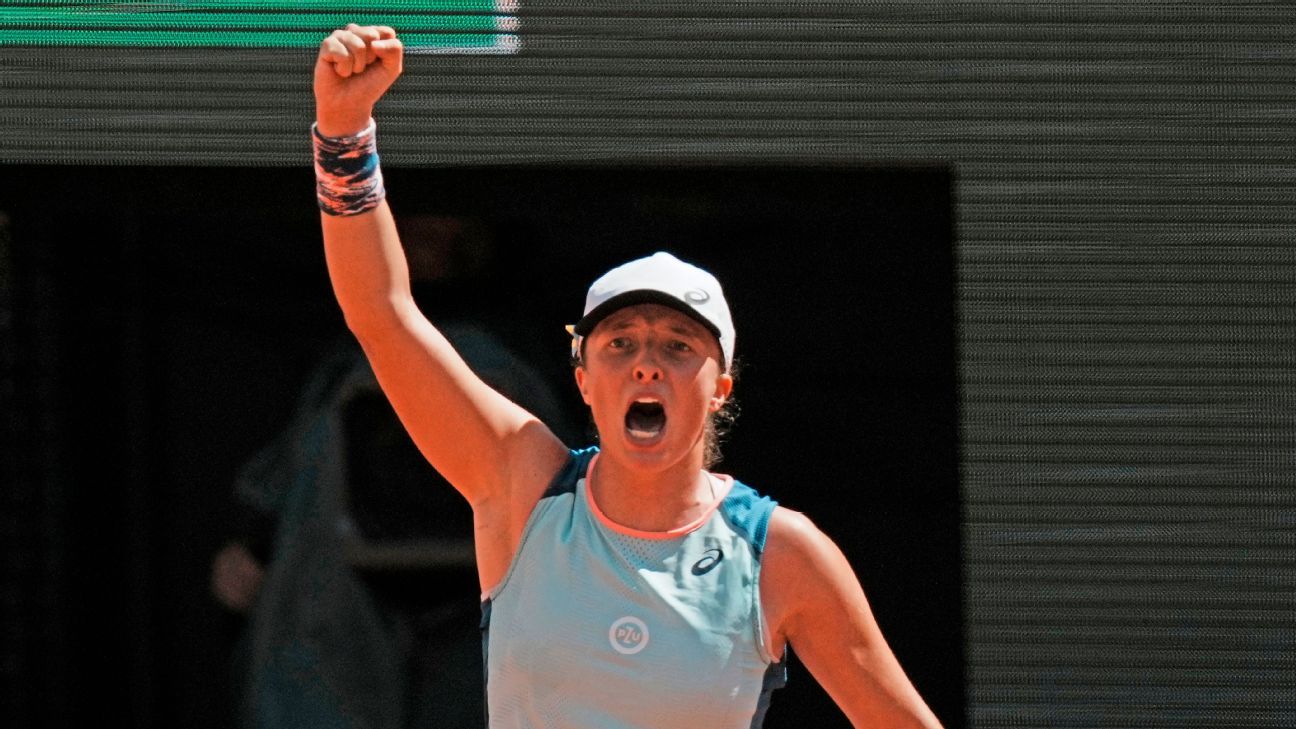
PARIS — Iga Swiatek benefited from the chair umpire’s no-call on a double bounce that gave her a key first-set service break during a match-altering five-game run and the French Open’s No. 1 seed moved into the semifinals with a 6-3, 6-2 victory over Jessica Pegula on Wednesday.
Swiatek extended her winning streak to 33 matches, the longest on tour since Serena Williams won 34 in a row in 2013.
Swiatek will face No. 20 Daria Kasatkina in one women’s semifinal Thursday, when the other will be No. 18 Coco Gauff, an 18-year-old American, against unseeded Martina Trevisan, a 28-year-old from Italy.
2 Related
Only Swiatek has previously participated in the final four at a major tournament, losing in the semifinals at the Australian Open in January and taking the title at the 2020 French Open when she was ranked outside the top 50.
“This year it’s a little bit different, because I’m not an underdog,” she said, “and everything has changed, honestly.”
Kasatkina beat No. 29 Veronika Kudermetova 6-4, 7-6 (5) in a match between two Russian players who will not be allowed to compete at Wimbledon later this month because of that country’s invasion of Ukraine.
Theirs was a mistake-filled quarterfinal, with the players combining for 75 unforced errors, 50 by Kudermetova. That allowed Kasatkina to win despite coming up with just 16 winners over the course of 165 points.
“It was a roller coaster,” said Kasatkina, who hadn’t reached a major quarterfinal in four years. “Just happy with the way I stayed on the court and didn’t put myself in the situation where I was disappointed and stuff. So really happy with this mental part.”
A day after her 21st birthday, Swiatek was not at her dominant best against the 11th-seeded Pegula, a 28-year-old from New York whose parents own the NFL’s Buffalo Bills and NHL’s Buffalo Sabres.
“Getting old, but still fresh,” Swiatek wrote with a silver marker on the lens of a courtside TV camera.
She was more pleased with herself than after her fourth-round win, in which she ceded a set for the first time in more than a month and felt “kind of like a cold shower.”
“It really helped me the last match, to kind of remind me what I have to do to make my tennis more efficient,” Swiatek said.
As usual for most of this season, Swiatek was good enough to end up on the right side of the scoreline. She has not lost a match since February and claimed the title at each of her past five tournaments.
Swiatek rose atop the WTA rankings in March after the woman who was No. 1, Ash Barty, retired at age 25. Rather than being derailed by the sudden switch in status, Swiatek has flourished, going 16-0 since rising from No. 2.
On a sunny afternoon at Court Philippe Chatrier, with the temperature above 70 degrees Fahrenheit (20 Celsius), Swiatek’s start was so-so for the second match in a row, although she did wind up with nearly twice as many winners as Pegula, 30 to 16.
“I feel like the ball is flying a little bit faster,” Swiatek said, “so I had to adjust to that, for sure.”
“To be honest, she kind of plays like a guy. And, I mean that as, Ash was a similar way, where they don’t play like a typical girl where they hit kind of flat and the ball kind of goes through the court. She plays a little more unorthodox in the fact that she has, like, a really heavy forehand,” Pegula said about Swiatek, “but at the same time she also likes to step in and take it really early, and I think clay gives her more time, and I think it makes her forehand even harder to deal with.”
She trailed 3-2 in the opening set, and it was 3-all when she held a break point while Pegula served.
Pegula tried a drop shot, and Swiatek ran to it, reaching out to flip the ball over the net at an impossible angle. Pegula could not get to that response, and the point went to Swiatek, giving her a 4-3 edge.
As Pegula went to the sideline for the ensuing changeover, she looked toward her coach, David Witt, in the stands, perhaps wondering whether Swiatek’s shot should have counted.
A TV replay confirmed it should not have: The ball landed a second time on her side of the net before going off her racket, so chair umpire Emmanuel Joseph should have ruled the point belonged to Pegula. But Joseph missed the extra bounce and, unlike at some other tournaments, officials at the French Open can’t consult video to make sure they get a call correct.
“I was like, `There’s no freaking way she got that.’ I was like, `Seriously?!’ Pegula said at her news conference. ”I looked at (Joseph) and he didn’t call it. You can’t say anything. And the problem is, once they make their decision, you can’t go back and change it.“
From there, Swiatek wouldn’t drop another game until she led by a set and 1-0 in the second. In all, she took 10 of the last 12 games.
When a reporter mentioned that double bounce, Swiatek seemed to stifle a smile, as if she had anticipated a question about that point.
“If it was two bounces, then I’m sorry,“ she said. “But at that point I was so focused to just get to the ball and to win the point that it is like I just went forward. These moments are pretty tricky, because it’s all on the umpire.”
